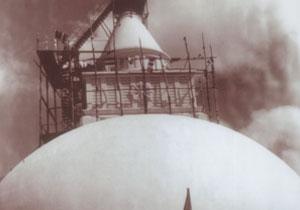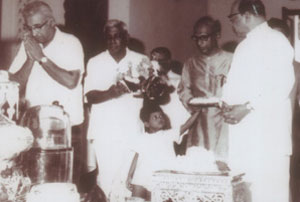As a young civil servant attached to the Kalutara Kachcheri, I was privileged to know Sir Cyril De Zoysa. His nephew Kingsley Wickremasinghe was my friend and we met at Kingsley's beautiful residence. Later I met Sir Cyril in his house in Colombo.
Sir Cyril de Zoysa was an illustrious national and religious hero. His motto was “Society will be adversely affected only when the individual is dishonest, and not when the individual is honest. The country will be adversely affected only when the individual idles, and not when he works”.
 |
| Kalutara Bodhi under construction |
He believed in the philosophy of, “Where there is a will, there is a way”, which he demonstrated through his extraordinary achievements across a multitude of fronts. Be it national, education, religious, economic, or political, Sir Cyril made an indelible contribution. His devotion to his work was complemented by a disposition that was devoid of partiality, hatred or fear. This made him a true national hero.
Sir Cyril was born in an era where Buddhists were gradually being roused from a mood of prolonged sluggishness which had set in following three centuries of colonial rule. The Buddhists in the island had progressively lost much of their fundamental rights and in the process, their self-respect too. The successful rescue operation of Buddhism was initiated by men of heroic stature whose names shall not fade away from the nation’s memory. They were the “Veera Puthun”--Anagarika Dharmapala, Mohattiwatte Gunananda Thera, Henry Steele Olcott, Sri Sumangala Thera, Harischandra Walisinghe among others.
It was precisely at this stage that a sturdy and spirited young Cyril, hailing from Balapitiya, entered the fray.
Buddhism in Kalutara had at this time reached a low ebb. There were no schools in the area for children of Buddhist parents. The beautiful Gangatilaka Vihara built about four – five centuries earlier on the banks of the Kalu ganga had been levelled to the ground by the invading Portuguese Army and there was no suitable place for worshippers. The only Sacred Bo-Tree on top of the hill had been spared, but had fallen in to a state of neglect.
This was a sad spectacle which kindled a spirit of revolt in the youthful Cyril whose reputation as a fearless young lawyer was fast gaining in repute. He was impressed and inspired by the religious fervour of a humble devotee, who tended to the Sacred Bo-Tree and Cyril himself vowed to restore the sacred area for the benefit of the Buddhists. On November 7, 1951 the untiring efforts of Cyril de Zoysa led to the establishment of the Kalutara Bodhi Trust, whose objective was to protect this sacred site. Utilising his personal funds, he transformed this holy site into one of the most respected and venerated places of religious worship in the country today.
During the colonial era, Galle Road was built between the Uda Maluva and the Pahala Maluva, splitting the site into two separate sections. The Bodhi premises was thus shared with the Government Agent’s office which inconvenienced both the Bodhi devotees and the general public who sought government related services.
Sir Cyril was able to persuade the Government to move its Agent’s offices to a new location, so as to allow development and restoration of the Bodhi premises. Having secured the land for his ambitious plan, Sir Cyril set in motion plans to build a hollow chaithya with great energy and dynamism. In consultation with the well-known engineer of the day, Dr. A.N.S.Kulasinghe, blueprints were drawn for a modern-day engineering marvel.
Built upon a pre-stressed concrete frame, the chaithya has a diametre of 95 feet and a circumference of 300 feet. The foundation for the imposing structure was laid in 1964, and after ten years of work the pinnacle of the chaithya was laid in January of 1974.
 |
| Cyril De Zoysa with Dudley Senanayake and others |
The pinnacle was unveiled and relics deposited in the inner chamber on February 28, 1980. Today, the magnificent structure is an imposing and glorious spectacle lying as it were at the entrance to the Kalutara town. Thousands of people pay homage to the Sacred Bodhi at Kalutara each day and its stature as a truly Sri Lankan spiritual shrine is demonstrated by the support it garners from Sri Lankans of all religious persuasions and from all walks of life.
Although Sir Cyril’s name is primarily associated with the Bodhi Tree at Kalutara, his services to furthering the cause of Buddhism was multifarious and extensive. Many Buddhist shrines, sites and institutions flourished through his generosity and he was at the forefront in the restoration of Kirivehera, at Kataragama, and the Pilgrims Rest at the same location.
Sir Cyril’s philanthropic deeds also assisted the development of Bellanwila Rajamahaviharaya, Kuppiyawatta Jayasekeraramaya, Saddharmakara Pirivena at Pinwatta and the construction of a Pilgrims Rest at Polonnaruwa.
Sir Cyril had a strong desire to provide education within a Buddhist environment to the children of Kalutara. Consequently, he founded the Kalutara Vidyalaya for Boys and Kalutara Balika Vidyalaya for girls, which today are leading educational institutions in the district. Kalutara Balika Vidyalaya in fact was first operated in his own house in 1942.
Sir Cyril also revived the London Buddhist Vihara which was fading into oblivion. He led the way to obtain a four-storey building in Ovington Gardens, London, on a ten-year lease and the Vihara re-opened for Vesak in 1954. Sir Cyril himself underwrote the annual rent of £ 700 for the full ten years.
Another area in which the farsighted Sir Cyril excelled was his determination to provide employment, which he realized was the most effective way of helping his countrymen.
He set up a large industrial complex in Kalutara South to manufacture car batteries, bicycle tyres, and tubes and then expanded into the field of tyre re-treading on a large scale. This was followed by ventures in the manufacture of electrical cables and refrigerators and thousands of villagers around Kalutara found employment in these factories. With each project that Sir Cyril embarked on, he ensured that they generated their own sources of income and were completely self-sustaining.
The nationalization of his bus company demonstrated Sir Cyril’s great sense of patriotism. Other owners who suffered the same fate ensured that they picked out the best parts off their vehicles, such as new tyres, before handing them over to Ceylon Transport Board. On the contrary, Sir Cyril instructed his staff to fit all the buses with brand new tyres and tubes and to have all the vehicles fully re-fuelled prior to handing them over.
Sir Cyril de Zoysa is also remembered for his activities connected with the Colombo Y M B A, where he was its President for 19 years, the Buddhist Theosophical Society, Kalutara Buddhist Society, Homes for the Aged as well as Homes for children. He undertook all this work with great enthusiasm.
It is a pleasure to observe that the Kalutara Bodhi Trust is following in the footsteps of Sir Cyril de Zoysa by forging ahead to revive and strengthen the Dhamma Schools and other activities for which it has set up a special arm – Bodhimaga Padanama. The Trust distributes free text books and stationery to Samanera (novices) receiving their education in Pirivenas and also provides assistance and funds for Upasampada ceremonies of all Nikayas.
It also provides alms to thousands of devotees observing sil on all full moon Poya days. Cattle on the verge of slaughter at the abattoirs are emancipated and these animals are given to poor farmers in the North Central Province so as to improve their economic well-being. The Bodhi Gnana Library established by the Trust in Kalutara North is reputed to be one of the best equipped libraries outside of Colombo. The motivation and enthusiasm for all these projects that are undertaken today stem from the one great source – Sir Cyril de Zoysa.
Sir Cyril de Zoysa is no more. He lived and practised a Buddhist way of life. He was born on October 26, 1896 and passed away on January 2, 1978 at the ripe old age of 82. In the late evening of his life, he attained a state of deep spiritual serenity. His words then convey the quintessence of the Buddhist way of life – “Now I am free. How rich you are does not matter.
Those are all delusive. I was born without any wealth. I will die without any wealth. Buddhism is my consolation, my happiness and my strength.”
The vision of Sir Cyril de Zoysa is now being carried forward, more effectively and efficiently, by the members of the Kalutara Bodhi Trust led by Sir Cyril’s nephews, Ajita de Zoysa as its Chairman, and Deshabandhu Tilak de Zoysa as its Honorary Secretary. The other Trustees are Deshabandhu Indradasa Hettiarachchi, Varuna Basnayake PC, Mrs. Chitra Mendis, Ashan de Zoysa and Vivendra Lintotawela.
The great legacy of Sir Cyril de Zoysa is one in which the fruits of his labour, vision and single-mindedness, have flowed through to the people of Sri Lanka who are today the ultimate beneficiaries.
Let the meritorious deeds done by you lead you to reach the Supreme bliss of Nibbana. |



